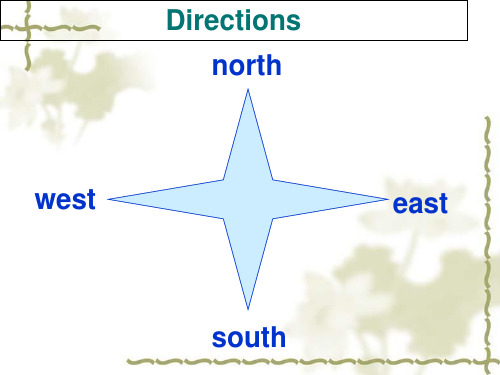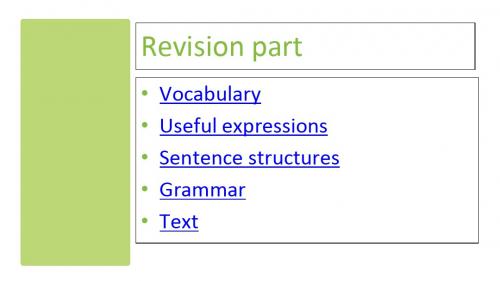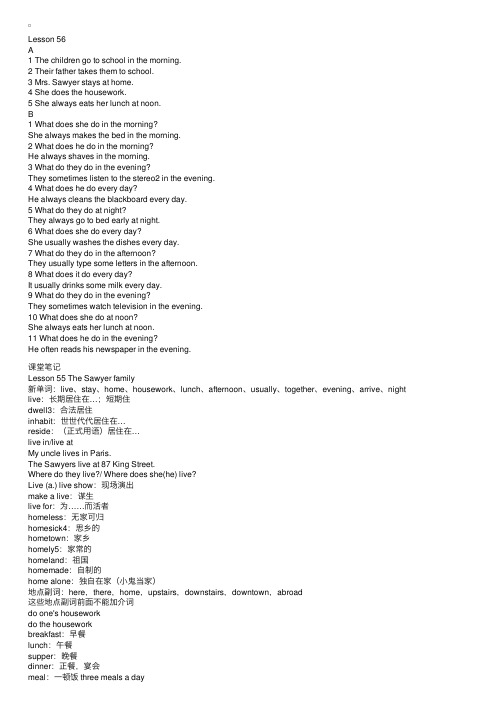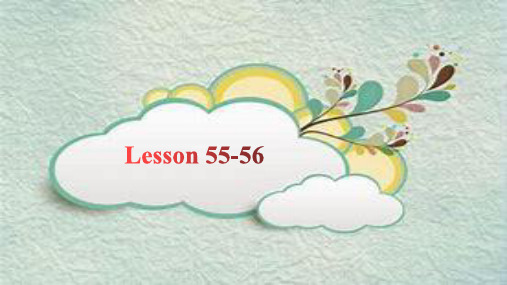新概念英语第一册56课课件
新概念英语第一册55-56-PPT课件

What do they usually do?
In the morning...... At noon...... In the afternoon...... In the evening...... At night......
Homework
Talk about your family
breakfast supper/dinner
The eating habits of Americans
美国人的饮食习惯
Breakfast
Breakfast time, the general in 8:00 They always eat baked bread, cereal and coffee,
3. At noon, who always eats lunch at home? Mr. or Mrs. Sawyer?
Mrs. Sawyer.
4. In the afternoon, what does Mrs. Sawyer usually do? What do they often do? She usually sees her friends. They often drink tea together.
到达……( 大地方) 到达……(小地方)
My father will arrive __i_n_ London tomorrow. I often arrive __/__home early in the evening.
Let’s read and remember the new words:
his wife watch television.
do one's homework 做作业
新概念英语第一册第55-56课件(共25张PPT)

表述客观规律或事实用一般现在时
The plane can fly in the sky. The earth goes around the sun. The book is yellow. He is tall. He is very smart! She is very beautiful!
谢谢观赏
You made my day!
我们,还在路上……
What do you usually do in the weekend? in your vacation?
Do some exercises: 1. ( c ) I often _____ up at 7:oo in the morning. My mother often
_____up at 6:30. A. get, get B. gets, gets C. get, gets D. gets, get 2. (B )Jim’s brother ____ in a factory. He usually _____ to work by car. A. work, go B. works, goes C. works, go D. work, goes 3. (A) ____ you always ____ basketball on Sundays? A. Do, play B. Does, play C. Are, playing D. Are, play 4. (D) _____ your father often____ TV in the evening?
Does she often do her homework at night?
Lesson 56 What do they usually do?
新概念第一册_L55-L56课件

New Word and expressions 生词和短语
•
live v. 住,生活 stay v. 呆在,停留 home n. 家;adv. 到家 housework n. 家务 lunch n. 午饭 afternoon n. 下午 usually adv. 通常 together adv. 一起 evening n. 晚上 arrive v. 到达 night n. 夜间
Be动词 结构;肯定句;主语+be+… 否定句;主语+ be+not+… 疑问句;Be+主语+…? Yes,主语+be No,主语+be+, everymorning/night/evening/day/week/year . always usually often sometimes seldom never 频 率副词 通常位于be动词, 助动词,情态动词 后,实义动词前。
Bye
bye !
See you next time!
在姓氏后加s,前面加上定冠词the, 表示某某一家人,如:the Smiths
表达地址时,在具体的门牌号前要用at, 在城市或者街名前要用in 如:They live at 87 king street. They live in king street. They live in Chengdu.
• Take sb to someplace. Eg: He takes his son to school.
• arrive是不及物 动词,在它后面 不可以直接跟名 词作为宾语, • 如:arrive at a village arrive in Shanghai
新概念英语第一册第56课课件.ppt

瑞典的 法国的
德国的 日本的
韩国的 英国的
美国的 意大利的
如何询问汽车的品牌呢?
• What make is the car ? • It’s a German car .
• What make is his / her / your car ? • It’s an American car .
• nice
adj.
美好的
• meet
v.
遇见
• Japanese adj.&n. 日本人
• Korean adj.&n. 韩国人
• Chinese adj&n. 中国人
• too
adv.
也
如何表明国籍呢?
• I am French/German/Japanese/Korean.
• He/She is Chinese/Japanese/German.
NAOKO:
Nice to meet you.
MR. BLAKE: And this is Chang-woo. He's Korean.
CHANG-WOO:Nice to meet you.
MR. BLAKE: And this is Luming. He is Chinese.
LUMNቤተ መጻሕፍቲ ባይዱ:
Nice to meet you.
New Concept EnglishⅠ First Things Frist
Zoe
Everyday English
1.Follow me! 跟我来!/跟着我!
2. Take it easy. 放松点!/慢慢来!
3. Have a try! 试一下!
新概念英语第一册第56课件ppt

• 这句话中的make是名词词性,意思是 产品牌号。 所以这句话的意思是:它是什么牌子 的? 回答:It's a...
• 这句话中的it是代词,这个位置也可以 用其他的名词 例如:What make is this pen?
为深入学习习近平新时代中国特色社 会主义 思想和 党的十 九大精 神,贯彻 全国教 育大会 精神,充 分发挥 中小学 图书室 育人功 能
作业
• 背诵第五课课文,并继续熟练第一课 和第三课的背诵。
• 听写单词。 • 熟练运用本节课所讲解的日常用语。
• suit
n.
school
n.
• teacher
n.
• son
n.
daughter n.
•伞 •请 • 这里 •票 • 号码 • 对不起的 • 先生 • 衣帽间 • 一套衣服 • 学校 • 老师 • 儿子 • 女儿
为深入学习习近平新时代中国特色社 会主义 思想和 党的十 九大精 神,贯彻 全国教 育大会 精神,充 分发挥 中小学 图书室 育人功 能
• ③ adj. 使人高兴的,令人愉快的 It is so nice to have you here.
为深入学习习近平新时代中国特色社 会主义 思想和 党的十 九大精 神,贯彻 全国教 育大会 精神,充 分发挥 中小学 图书室 育人功 能
Nice to meet you!
• 在初次见面时可以说这句话,回答是: Nice to meet you,too.
选择疑问句
• 在两者或三者中进行选择,在一般疑 问句后用or进行连接。
• 选择疑问句词调一般是前升后降。 • 回答必须要用完整的句子回答。
例如:-Is she a teacher or a worker?
新概念第一册第55-56课课件PPT课件

At night
the children Mr. Sawyer
do their homework, go to bed reads his newspaper
Mr. Sawyer and
watch television
his wife 第22页/共28页
第21页/共28页
When In the morning
Who
Mr. Sawyer
the children
Mrs. Sawyer
At noon
In the afternoon
Mrs. Sawyer Mrs. Sawyer
In the evening
the children Mr. Sawyer
What
第12页/共28页
• ①stop-stops [s] ; make-makes [s] • ②read-reads [z] ; play-plays [z] • 1.大多数动词在词尾加“s”在清辅音后发音为[s],在浊辅音及元音后发音为 [z]。
第13页/共28页
• fly-flies [iz]; carry-carries [iz] • study-studies [iz]; worry-worries [iz] • 2、以辅音字母加“y”结尾的,要先将“y”变为“i”,然后再加“es”读[iz]
➢频率副词 often, usually, sometimes, always
第18页/共28页
主谓结构
主语不是单三: 主语+实义动词原形
主语是第三人称单数:
主语+实义动词单三形式
1.一般动词末尾直接加-s
2019教育新概念英语第一册Lesson56(72张PPT)数学

Is this your umbrella?
No, it isn’t.
Is this it?
Yes, it is. Thank you very much.
New Concept English 1
Lesson5 Nice to meet you.
New words – Lesson 5
• 1 Mr. ['mistə] 先生 • 2 good [gud] a.好 • 3 morning ['mɔ:niŋ] n.早晨 • 4 Miss [mis] 小姐 • 5 new [nju:] a.新的 • 6 student ['stju:dənt] n.学生 • 7 French [frentʃ] a.& n.法国人
name is Jack.
My coat and my umbrella please.
Here is my ticket.
Thank you, sir. Number five.
Here is your umbrella and your coat.
Sorry, sir.
This is not my umbrella.
• Now can you introduce your family ? • Family members. • Introduce one member who you like most.
Revision one Vocabulary
• Here is the example. • He is my father. • He is a farmer. • His hobby is cooking. • Every morning, he cooks porridge for
新概念第一册精讲第56课:索耶一家人TheSawyerfamily

Lesson 56A1 The children go to school in the morning.2 Their father takes them to school.3 Mrs. Sawyer stays at home.4 She does the housework.5 She always eats her lunch at noon.B1 What does she do in the morning?She always makes the bed in the morning.2 What does he do in the morning?He always shaves in the morning.3 What do they do in the evening?They sometimes listen to the stereo2 in the evening.4 What does he do every day?He always cleans the blackboard every day.5 What do they do at night?They always go to bed early at night.6 What does she do every day?She usually washes the dishes every day.7 What do they do in the afternoon?They usually type some letters in the afternoon.8 What does it do every day?It usually drinks some milk every day.9 What do they do in the evening?They sometimes watch television in the evening.10 What does she do at noon?She always eats her lunch at noon.11 What does he do in the evening?He often reads his newspaper in the evening.课堂笔记Lesson 55 The Sawyer family新单词:live、stay、home、housework、lunch、afternoon、usually、together、evening、arrive、night live:长期居住在…;短期住dwell3:合法居住inhabit:世世代代居住在…reside:(正式⽤语)居住在…live in/live atMy uncle lives in Paris.The Sawyers live at 87 King Street.Where do they live?/ Where does she(he) live?Live (a.) live show:现场演出make a live:谋⽣live for:为……⽽活者homeless:⽆家可归homesick4:思乡的hometown:家乡homely5:家常的homeland:祖国homemade:⾃制的home alone:独⾃在家(⼩⿁当家)地点副词:here,there,home,upstairs,downstairs,downtown,abroad这些地点副词前⾯不能加介词do one's houseworkdo the houseworkbreakfast:早餐lunch:午餐supper:晚餐dinner:正餐,宴会meal:⼀顿饭 three meals a dayin the afternoonin the eveningat nightarrive in/atgo to work:去上班go to school:去上学take sb. to somewhere:带某⼈去……see one's friends:拜访……的朋友drink tea together:⼀起喝茶come home from school:从学校回家come home from work:下班回家arrive home:到家live at, go to work, go to school, take to, stay at home, do the housework, eat one's lunch, see one's friends, drink tea togher, come home from school, arrive home, come home from work, do one's homework, go to bed, read one's paper, wathe TV The Sawyers live at 87 King Street.In the morning, Mr. Sawyer goes to work and the children go to school.Their father takes them to school every day.Mrs. Sawyer stays at home every day.She does the housework.She always eats her lunch at noon.In the afternoon, she always sees her friends.They often drink tea together.In the evening, the children come home from school.They arrive home early.Mrs. Sawyer comes home from work.He arrives home late.At night, the children always do their homework.Then go to bed.Mr. Sawyer usually reads his newspaper, but sometimes he and his wife watch television.by――表⽰某种⽅式by car/bus/trainThey go to school by car every day.They are going to school by bus today.on footThe children are going to school on foot.at+时间The children come home from school at 5 every day.。
新概念第一册56课 PPT课件

• Mr. 先生
Mr.用于男士的姓之前,不能单独使用,如课文 中的 Mr.Blake;而sir 一般单独使用,是对长者、 上司或男顾客的尊称,如:Sorry, sir. 对不起, 先生。
• Miss 小姐 一般用于指未婚女子,不过有时在不知道 对方是否已婚时也可使用.
26
不定冠词a
6
• French [frentʃ] adj.&n. 法国人 • German ['dʒə:mən] adj.&n. 德国人 • nice ['nais] adj. 美好的 • meet [mi:t] v. 遇见 • Japanese [ˌdʒæpə'ni:z] adj.&n. 日本人 • Korean [kə'riən] adj.&n. 韩国人 • Chinese [ˌtʃai'ni:z] adj&n. 中国人 • too [tu:] adv. 也
• 冠词数量上表示“一个”。冠词一共有 三个,分为不定冠词(a,an)和定冠 词(the)。
• 可数名词单数前面必须要用不定冠词。 a用在以辅音音素开头的名词前面 an 用于以元音开头的名词前面 例如:a pen an apple an umbrella an egg an hour a shirt
• ② adj. 和蔼的,友好的 He is very nice to his neighbours.
2. --Is this your umbrella? -- No, it D____ .
A. is B. not is C. my D. isn’t
3. – What is your name? –Pardon? --_A____
新概念英语第一册_55_56课课件

eg :My best friend and I live together. eg :We sometimes drink coffee together.
evening n. 晚上
一般指下午以后和上床睡觉前 这段时间比night的时间要早。 night 一般指夜里
night n. 夜间
good night 晚安 at night 在夜里 all night along 一整夜
arrive v. 到达
arrive in 后面一般接城市或国家 arrive in France arrive 后面可直接加副词 arrive here arrive there arrive home arrive at 后面接的地点,一 般是公共场所或某座大楼。 arrive at the hotel
sework n. 家务 h n. 午饭 ernoon n. 下午
usually adv. 通常 together adv. 一起 evening n. 晚上 arrive v. 到达 night n. 夜间
live v. 住,生活(是指长久的居住,住在自己家中)
eg: where do you live ? 你住在哪里?
reads her
milk
eats her lunch newspaper
Bye---bye!
知识回顾 Knowledge Review
—I usually play on the computer.
dusts the makes the cupboard bed
shaves
listen
cleans the go to bed blackboard
新概念第一册56课课件PPT课件

2021/7/23
第27页/共40页
Homework
• 1.抄写第五课单词(3+1),课文按 格式抄写一遍 • 2.完成课时训练、 • 背诵第五课课文及单词
2021/7/23
第28页/共40页
瑞典的
Swedish
法国的
French
第29页/共40页
德国的
German
日本的
Japanese
第30页/共40页
例如:-Is she a teacher or a worker?
-She isn't a teacher. She's a worker. 第37页/共40页
Written exercises B
Using He,She,It,a or an. Eg:
This is Miss Sophie Dupont. French/(Swedish) --Is she a French student or a Swedish student? --She isn't a Swedish student. She's a French student.
感谢您的观看!
第40页/共40页
Everyday English
1.Follow me! 跟我来!/跟着我!
2. Take it easy. 放松点!/慢慢来!
3. Have a try! 试一下!
第1页/共40页
Review 3--4 Is this your...?
第2页/共40页
练一练
B 1. Excuse ____ ! Is this your hamdbag? D. I
韩国的
korean
新概念第一册 lesson55-56课件

She usually sees her friends.
7. What do they often do in the afternoon?
They often drink tea together.
3-1 reading
Mr. Sawyer goes to work.
2. What do the children do in the morning?
The children go to school.
3. Who takes them to school every day?
Their father takes them to school every day.
They arrive home early .
Mr. Sawyer come home from work
home地点副词,前面不能加介词。 常见的地点副词还有:
. here、there、upstairs、downstairs.
He arrives home late .
3-1 reading
At night, the children always do their homework . Then they go to bed . Mr. Sawyer usually reads his newspaper , but sometimes he and his wife watch television .
做作业 做家务 下班回家 放学回家 读报纸 到家 睡觉 见朋友 看电视 喝茶 待在家 去上学 去上班
the children
in the morning go to school at noon
新概念英语第一册 55-56课件(共26张ppt)

Can you describe the daily routine of Mr.Bird?
The Sawyer family When do the children do their homework?
The Sawyers live at 87 King Street. In the morning,Mr.Sawyer goes to work and the children goes to school. Their father takes them to school every day.Mrs. Sawyer stays at home every day.She does the housework. She always eats her lunch at noon. In the afternoon,she usually sees her friends. They often drink tea together.
87 King Street go to work go to school stay at home do the housework see friends drink tea together do their homework go to bed read newspaper sometimes watch television
home /həʊm/ 家,家乡,祖国;回家,发源地 home and abroad 国内外 This southwest region of France is the home of wine. Take off your jacket and make yourself at home. I want to go home. A home is not just a house,it's the bond of a family.
新概念英语第一册-55-56课课件

学习英语常用表达
详细描述
Text B包含了一些英语常用表达和句型,通过学习这些表达和句型,学生可以更好地掌握英语口语和写作技巧,提高英语应用能力。
Text B
了解英国教育体系
总结词
Text C介绍了英国的教育体系,包括小学、中学和大学的教育体制、课程设置和教学方式等,旨在帮助学生更好地了解英国的教育情况。
Vocabulary exercises
Multiple choice: Choose the correct meaning of a given word from a list of choices.
Vocabulary exercises
Lesson 56 Vocabulary Exercises
Reading exercises
Writing Practice
07
Writing guidance
Introduction
Task Description
Example
Assessment Criteria
Provide a brief overview of the writing task and its importance.
This tense is used to talk about an action that started in the past and is still continuing in the present. It is formed by using "have been" + -ing form of the verb.
提高听、说、读、写能力
本课程注重全面提高学生的英语能力,通过大量的听力、口语、阅读和写作练习,帮助学生提高英语的实际应用能力。
新概念英语第一册 Lesson55-56 课 (共19张ppt)

In the evening,the children come home from school. They arrive home early. Mr. Sawyer comes home from work. He arrives home late. At night ,the children always do their homework,then they go to bed. Mr.Sawyer usually reads his newspaper, but sometimes he and his wife watch television.
every day ; on Sundays…
am is are 动词原形、动词的三单形式
动词三单式
1. 一般情况词尾+s 2. s(随) sh (时) ch (出) x(现) o(哦)结尾的动词,后+es 3.以辅音字母+y结尾的词 ,先变y为i, 再+es 4.以元音字母+y结尾的词 ,直接+s
In the evening,the children come home from school. They arrive home early. Mr. Sawyer comes home from work. He arrives home late. At night ,the children always do their homework,then they go to bed. Mr.Sawyer usually reads his newspaper, but sometimes he and his wife watch television.
The Sawyers live at 87 King Street. In the morning,Mr.Sawyer goes to work and the children go to school. Their father takes them to school every day.Mrs. Sawyer stays at home every day.She does the housework. She always eats her lunch at noon. In the afternoon,she usually sees her friends. They often drink tea together.
- 1、下载文档前请自行甄别文档内容的完整性,平台不提供额外的编辑、内容补充、找答案等附加服务。
- 2、"仅部分预览"的文档,不可在线预览部分如存在完整性等问题,可反馈申请退款(可完整预览的文档不适用该条件!)。
- 3、如文档侵犯您的权益,请联系客服反馈,我们会尽快为您处理(人工客服工作时间:9:00-18:30)。
•
a piece of news 一条新闻
too [tu:] adv.也 ,又,还
• 用法:一般放于肯定句末,表示“也” eg: I have the English book,too. I know the answer,too. 放在形容词的前面表示 太;过于: eg: The hat is too big. 帽子太大。 Summer is too hot. 夏天太热了。 That's too bad. 那太糟糕了。
• German ['dʒə:mən] adj.& n.德国人 • nice ['nais] adj.美好的 • meet [mi:t] v.遇见 • Japanese [dʒæpə'ni:z] adj.& n.日本人 • Korean [kə'riən] adj.& n.韩国人 • Chinese [tʃai'ni:z] adj.& n.中国人 • too [tu:] adv.也
Nice to meet you!
• 在初次见面时可以说这句话,回答是: Nice to meet you,too.
• 在初次见面时还可以说: How do you do. 回答也是 How do you do.
new [nju:] adj.新的
• 相关词组 New Year 新年
•
news 新闻(不可数名词)
Chinese [tʃai'ni:z] 中国的;中国人
French [frentʃ] 法国的;法国人
German ['dʒə:mən] 德国的;德国人
Japanese [dʒæpə'ni:z] 日本的;日本人
Korean [kə'riən] 韩国的,韩国人
Swedish ['swi:diʃ] 瑞典的;瑞典人
• Miss [mis] 小姐 一般用于指未婚女子,不过有时在不知道 对方是否已婚时也可使用
• Good morning. 早上好 那么下午好和晚上好还记得怎么说吗?
Good afternoon. Good evening. 再见 晚安 good bye 祝你好运good night
good luck
• ticket
n.
• number
n.
• sorry
adj
• sir
n.
cloakroom n.
•伞 •请 • 这里 •票 • 号码 • 对不起的 • 先生 • 衣帽间
练一练
1. Excuse B____ ! Is this your hamdbag?
A. you B. me C. it D. I
Be动词的缩写形式
• I am-I’m • I am not-I’m not • He/She/It is-He’s/She’s/It’s • He/She/It is not-He/She/It isn’t • We/You/They are-We’re/You’re/They’re
We/You/They are not- We/You/They aren’t
一. Listen to the tape ,then answer this question “Is Chang-woo Chinese?”
不定冠词a
• 冠词数量上表示“一个”。冠词一共有 三个,分为不定冠词(a,an)和定冠 词(the)。
• 可数名词单数前面必须要用不定冠词。 a用在以辅音音素开头的名词前面 an 用于以元音开头的名词前面 例如:a pen an apple an umbrella an egg an hour a shirt
nice ['nais] adj.美好的
• ① adj. 美好的,好看的 It’s a nice day today, isn’t it? That's a nice shirt.
• ② adj. 和蔼的,友好的 He is very nice to his neighbours.
• ③ adj. 使人高兴的,令人愉快的 It is so nice to have you here.
三. Text Appreciation:
Mr.
French
nice
China
meet
根据英语说汉语
Japanese
Kore早上好
德国人
学生
法国人
美好的
韩国人
根据汉语说出英 语
New words
• Mr. ['mistə] 先生 • good [gud] adj.好 • morning ['mɔ:niŋ] n.早晨 • Miss [mis] 小姐 • new [nju:] adj.新的 • student ['stju:dənt] n.学生 • French [frentʃ] adj.& n.法国人
Lesson 5
Nice to meet you.
复习 • 这是我的......
Here's my... • 这个不是我的......
This is not my... • 号码的表达方法
Number...
上一节课的单词
• umbrella n.
• please
int.
• here adv.
2. --Is this your umbrella? -- No, it D____ .
A. is B. not is C. my D. isn’t
3. – What is your name? –Pardon? --_A____
A. What is your name?
B. Is this your hamdbag?
C. Thank you very much!
D. Nice to meet you.
单词讲解
• Mr. ['mistə] 先生
Mr.用于男士的姓之前,不能单独使用,如课文 中的 Mr.Blake;而sir 一般单独使用,是对长者、 上司或男顾客的尊称,如:Sorry, sir. 对不起, 先生。
如何询问国籍呢?
• What nationality is she /he ? • She’s French/Chinese/German/Korean • He’s …. • What is your nationality ? • I am American / Italian / English .
